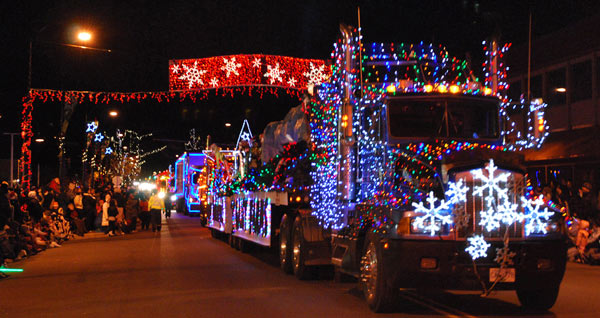Cloverdale: Growing community uses events to retain identity
January 12, 2010 by Sarah Jackson

A decorated semi tractor-trailer entertains a crowd of thousands during Cloverdale's annual Santa's Parade of Lights. (Photo submitted by Cloverdale Business Improvement Association)
Cloverdale streets were decked out with Christmas lights, crammed with people and covered in decorated semi tractor-trailers and trucks on Dec. 6 at Hawthorne Square.
The Santa’s Parade of Lights, put on by the Cloverdale Business Improvement Association (BIA) in partnership with the Cloverdale District Chamber of Commerce, is one of five annual events held in the area to maintain Cloverdale’s historic small-town identity and strengthen the sense of community.
The Cloverdale BIA was expecting a crowd of 7,000 people to line the streets for the parade, out of a population of only 55,000 people in the small section of Surrey. The area was once entirely farmland, and is still sustained by blueberry crops, but is now considered a peri-urban community (an area adjoining an urban space), because of its location at the centre of a rapidly growing city.
The growth has caused the Cloverdale BIA to create guidelines and larger-scale plans of action to promote the area’s historical western identity, which is the foundation for the local economy. Cloverdale does not have any above-ground parking, parking meters or big-box businesses, which helps maintain the small-town culture.
“[Cloverdale] is filling in and growing at an unbelievable rate, unmatched about anywhere in B.C.,†said Paul Orazietti, executive director of the Cloverdale BIA.
One way that the BIA is responding to urbanization is by adding a social-responsibility aspect to the parades and festivals. This is the third year that the holiday parade was collecting donations for the Surrey Christmas Bureau and the Surrey Food Bank, with a goal of collecting $5,000 and two-and-a-half tons of food for the food bank.
“Charity has taken a much higher profile,†said Orazietti, adding that homelessness is a growing problem in Cloverdale. At one point, over 50 people were living in the town centre, he said.
The events serve to bring locals together and promote opportunities to give back, but they also exemplify Cloverdale’s identity to nonresidents.
Stores are decorated, businesses are welcoming – it’s all part of a plan to encourage outsiders to feel like they are a part of the community, too.
Economically, Cloverdale is challenged by its avoidance of large stores such as Safeway, whose nearest location is in Langley. But small-town values have led the BIA to resist the introduction of such businesses, preferring to support local businesses instead. These steps aim to protect the community’s assets while events build sustainability, he said.
Cloverdale is on a path that may head towards transformed economy and increased symbolism, as small-town community features become replaced with modern infrastructure, according to Jacqueline Mulcahy, member of the Maple Ridge Community Heritage Commission and a post-graduate urban-studies student at Simon Fraser University.
The community may find itself using street signage and banner programs as a reminder of the original identity, as was done in North Vancouver, if the rapid population growth continues, said Mulcahy.
“It’s impossible for communities to resist [change],†she said. “A sense of identity is necessary in any community.
“You have to have some means of a discourse,†Mulcahy said. “If you don’t have a sense of collective identity, it’s very difficult to have political engagement and it’s difficult to have a consensus.â€
Individuals in the area are also realizing that parades and festivals are a good way to help the younger generation plug into Cloverdale’s traditional values and history. Rick Hughes, the vice-president of Lord Tweedsmuir Secondary School, is trying to encourage youth to get involved in organizing parades, sports camps and other local events.
“It’s up to my generation to make sure that we’re passing all this into succeeding generations,†said Hughes. “There’s a lot of young folks out there that think, ‘Well, I’ll do it if there’s an immediate payoff’ instead of ‘I’ll do it if it’s helping somebody out.’â€
Hughes has lived in Cloverdale his entire life, and has helped organize parades, the rodeo and the creation of Surrey Museum over the last half-century. When he was a child, all of his neighbours knew each other, but that is not the case anymore, though there are still some core families that remain. He welcomes different ideas and lifestyles, but added, “It’s important to remember the things that got you where you are.â€



Comments
Feel free to leave a comment...
For details on how we handle comments, select "Our Comment Policy" from the "About" drop-down menu at the top of the page.
Note: All comments are moderated and must be approved before they are published.